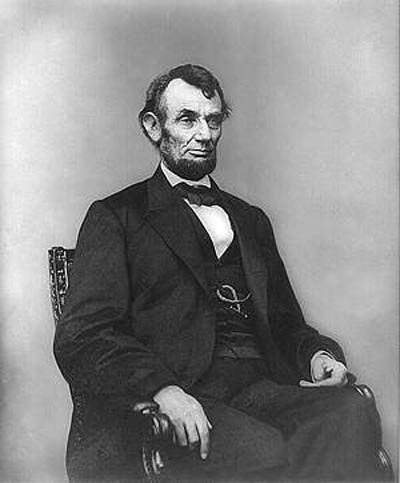
Abraham Lincoln (1809 – 1865) was the 16th President of the United States of America from March 1861 until his assassination in 14th April 1865. Lincoln is remembered for successfully leading his country through its greatest constitutional, military and moral crisis – the American Civil War – preserving the Union while ending slavery, and promoting economic and financial modernisation. Six days after the surrender of Confederate commanding general Robert E. Lee, Lincoln was assassinated by gunshot to the head (during a visit to Ford’s Theatre) by Confederate sympathiser John Wilkes Booth. His death was the first assassination of a U.S. president and sent the nation into mourning. Lincoln has been consistently ranked by scholars and the public as one of the three greatest U.S. presidents.
It is alleged that Lincoln had a premonition of his death shown to him in a dream he reported having shortly prior to the shooting by Booth. He told this dream to his wife and friends, including bodyguard Ward Hall Lamon, who immediately transcribed the conversation:
About ten days ago, I retired very late. I had been up waiting for important dispatches from the front. I could not have been long in bed when I fell into a slumber, for I was weary. I soon began to dream. There seemed to be a death-like stillness about me. Then I heard subdued sobs, as if a number of people were weeping. I thought I left my bed and wandered downstairs. There the silence was broken by the same pitiful sobbing, but the mourners were invisible. I went from room to room; no living person was in sight, but the same mournful sounds of distress met me as I passed along. I saw light in all the rooms; every object was familiar to me; but where were all the people who were grieving as if their hearts would break? I was puzzled and alarmed. What could be the meaning of all this? Determined to find the cause of a state of things so mysterious and so shocking, I kept on until I arrived at the East Room, which I entered. There I met with a sickening surprise. Before me was a catafalque, on which rested a corpse wrapped in funeral vestments. Around it were stationed soldiers who were acting as guards; and there was a throng of people, gazing mournfully upon the corpse, whose face was covered, others weeping pitifully. ‘Who is dead in the White House?’ I demanded of one of the soldiers, ‘The President,’ was his answer; ‘He was killed by an assassin.’ Then came a loud burst of grief from the crowd, which woke me from my dream. I slept no more that night; and although it was only a dream, I have been strangely annoyed by it ever since.
A downcast Lincoln said the weird dream had haunted and possessed him for the past several days. Mary Lincoln and Lamon both became alarmed at the ominous implications, and Lincoln tried to reassure them by saying it probably meant nothing. He doesn’t seem to have believed that himself, though. Death by assassination was a real and constant threat; Lincoln knew for a fact that Southern sympathisers were plotting to kill him. He also knew from his close reading of Shakespeare and the Bible that especially memorable dreams can portend the imminence of death. His earlier night visions focused on the well-being of his children, but now his dreaming imagination turned to the dangers looming over his own life. After Lincoln was shot the night of 14th April, an anguished Mary was heard to exclaim: “His dream was prophetic!”

